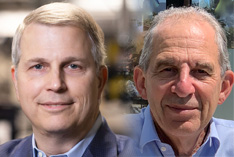Comstock Prize in Physics

To get awards news straight to your inbox, make sure to sign up for our Connect with Awards newsletter.
About the Comstock Prize in Physics
Awarded to recognize a North American resident for a recent innovative discovery or investigation in electricity, magnetism, or radiant energy. The award is presented with a $50,000 prize and $50,000 to support the recipient's research. Established through the Cyrus B. Comstock Fund.
Most Recent Recipient
 |
Michel H. Devoret and Robert Schoelkopf, Yale University, will receive the 2024 Comstock Prize in Physics.
Devoret and Schoelkopf’s groundbreaking work established non-linear quantum optics in electrical circuits at the single-photon level and has enabled new insights into, and control of, macroscopic quantum systems, and advances in quantum measurements, quantum information processing and quantum error correction. Read more about their work»
Award History
Previous recipients of the Comstock Prize in Physics continue to achieve outstanding advancements in their fields. Eight recipients have been honored with a National Medal of Science, and 10 recipients have received a Nobel Prize in Physics (Millikan 1923; Davisson 1937; Bridgman 1946; Lawrence 1939; Shockley 1956; Townes 1964; Schrieffer 1972; Cooper 1972; Davis 2002; Hänsch 2005).
Recipients:
Michel H. Devoret and Robert Schoelkopf (2024)
For the experimental development of ‘Circuit QED,’ realizing non-linear quantum optics in electrical circuits at the single-photon level and enabling new insights into, and control of, macroscopic quantum systems, quantum measurements, quantum information processing and quantum error correction.
Read more about their work»
Michal Lipson (2019)
For her pioneering contributions to silicon photonics based on high confinement optical structures including the demonstration of electro-optic modulation in silicon, parametric oscillation, and extreme confinement of light in waveguides.
Read more about Lipson's work»
Watch Lipson's acceptance speech»
Deborah S. Jin (2014)
For demonstrating quantum degeneracy and the formation of a molecular Bose‐Einstein condensate in ultra‐cold fermionic atomic gases, and for pioneering work in polar molecular quantum chemistry.
Watch Jin's acceptance speech»
Charles L. Bennett (2009)
For his mapping of the cosmic microwave background and determining the universe's age, mass-energy content, geometry, expansion rate, and reionization epoch with unprecedented precision.
John N. Bahcall (2004)
For his many contributions to astrophysics, especially his definitive work on solar models and his crucial role in identifying and resolving the solar neutrino problem.
John Clarke (1999)
For his major contributions to the development of superconducting quantum interference devices (SQUIDS) and their use for scientific measurements, especially involving electricity, magnetism, and electromagnetic waves.
E. L. Hahn (1993, shared)
For his revolutionary discoveries in magnetic resonance and coherent optics, in particular for the Hahn Spin Echo, the Hartman-Hahn Cross-polarization, and self-induced transparency.
Charles P. Slichter (1993, shared)
For his seminal contributions to the development and application of magnetic resonance in condensed matter, including the first experimental proof of pairing correlations in superconductors and fundamental studies in surface science and catalysis.
Paul C. W. Chu and Maw-Kuen Wu (1988)
For discovery of superconductivity in yttrium barium copper oxide and similar compounds above the boiling point of nitrogen -- a major scientific and technological breakthrough.
Theodor W. Hansch and Peter P. Sorokin (1983)
Raymond Davis, Jr. (1978)
Robert H. Dicke (1973)
Leon N Cooper and J. Robert Schrieffer (1968)
C. S. Wu (1963)
Charles H. Townes (1958)
William Shockley (1953)
For his pioneering investigations and exposition of electric and magnetic properties of solid materials; in particular for his researches in the conduction of electricity by electrons and holes in semiconductors.
Merle A. Tuve (1948)
For his pioneering work on the upper atmosphere and his development of the electrical pulse method of study; for his pioneering work in nuclear physics utilizing the electrostatic generator; and for his development of the proximity fuse.
Donald W. Kerst (1943)
For his pioneer work in connection with the development of the betatron and the results which he obtained with this new and powerful scientific tool.
Ernest O. Lawrence (1938)
Percy W. Bridgman (1933)
For his investigations leading to increased understanding of the electrical constitution of matter.
Clinton J. Davisson (1928)
In recognition of his experimental work demonstrating that under certain conditions, electrons behave as we would expect trains of waves to behave.
William Duane (1923)
Samuel J. Barnett (1918)
Robert A. Millikan (1913)

